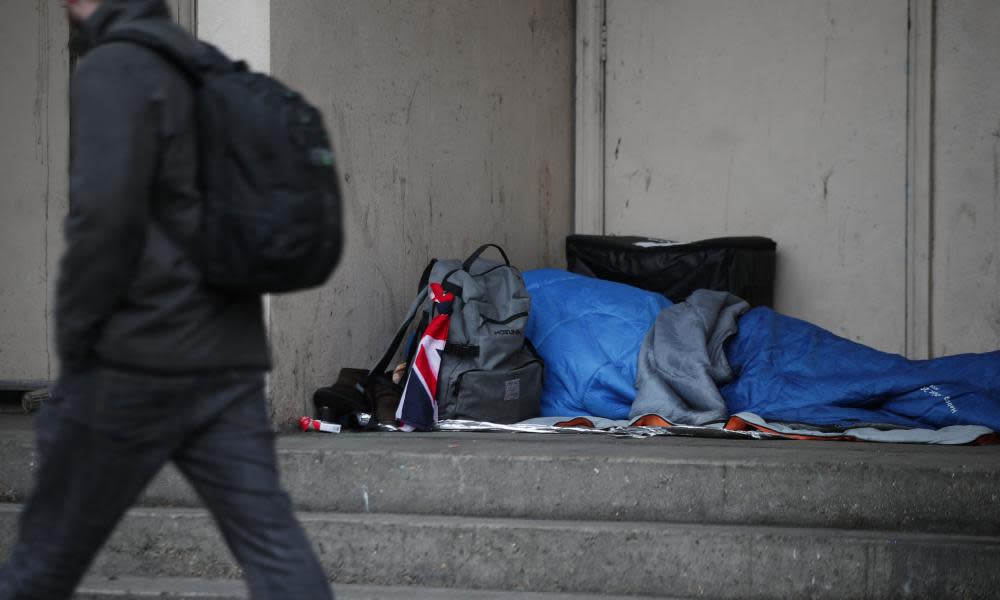Hundreds of deaths of homeless people 'going unexamined'

Hundreds of deaths of vulnerable homeless people in England and Wales are going unexamined, an investigation has found.
Web scraping and freedom of information requests submitted by the Bureau of Investigative Journalism (BIJ) have revealed that safeguarding adults reviews (SARs) – which charities say are crucial to determining whether the deaths could have been prevented – have almost never been set up after homeless people’s deaths.
Nearly 300 homeless people have died since 2013, data previously compiled by the BIJ – as part of its Dying Homeless project – and the Guardian has shown. Of those deaths, 102 have occurred since October last year, an average of three people a week.
Despite that, only eight SARs into homeless deaths have been launched since 2010, the research showed. They also found that not a single official review has been launched into any of 83 recent deaths. In those cases, just one informal review had been launched.
Experts have warned that, with no formal count of deaths and with so few reviews, officials cannot determine why so many homeless people are dying and take action to prevent future deaths.
Jeremy Swain, chief executive of Thames Reach, called the findings “enormously disappointing.” He added: “This unfortunately leads me to the disturbing conclusion that the death of someone sleeping rough is viewed as less important than of a housed person.”
The deaths this year include a 41-year-old man in Bristol who was said to be suffering “prolonged starvation”, an 81 year-old man with no known family members, and a 69-year-old man found in an abandoned shed, whose body was so badly decomposed that the coroner could find no cause of death.
This week, Worcester City council published an informal review into Cardon Banfield’s death. It comes years after local campaigner and former rough sleeper Hugo Sugg took up the cause. He had met Banfield years before and remembers “a talkative and really interesting guy”.
Banfield’s partially mummified body was found in a tent, just metres from a public footpath in Worcester. The homeless 74-year-old, who had settled in the UK from the Caribbean in 1961, part of the Windrush generation, was so badly decomposed that the coroner was only able to identify him through DNA testing.
Through freedom of information requests, Sugg uncovered council paperwork, seen by the BIJ, which proved that the council’s housing team had registered the man in 2014.
“Cardon’s name was right there, 20cm from the council’s logo,” he said, “so them saying that he’d never accessed services was just wrong.”
At first the council said it would only hold a review if and when there was another homeless death. “Which shocked everyone ... This notion of you’re going to wait until someone else dies, this again before you do anything?! I was utterly horrified by that,” said Sugg.
The city council has since completed an informal review, which was published earlier this week. However, because of the informal nature of the council’s review, the independent investigator had no statutory or legal powers to force people to comply or hand over relevant information. The report’s author also notes that, given the timeframe, many people who would have been aware of Banfield have moved on and were not contactable.
The report contains a series of recommendations for the council, including the suggestion that it: “Develop and implement a protocol for working with individuals that are transient. This protocol should include an ‘alert’ system for services to indicate when an individual that is known to be transient presents in the area and is at possible risk of rough sleeping”.
Homelessness charities, including Homeless Link, say the best practice is for every homeless death to be followed by a SAR. A review of this nature brings together agencies and individuals that worked with a vulnerable adult – including doctors and outreach workers – to determine what could have been done differently to prevent a harm or death.
While there is no central database for SARs, the BIJ investigation found 52 reviews published online since 2010.
Rick Henderson, chief executive of Homeless Link, called the findings “concerning”. He added: “[Reviews] will help public and voluntary agencies to identify how they might have intervened earlier or worked differently to avoid an individual falling through the gaps. The learning and recommendations from these reviews are invaluable.”
A Ministry of Housing, Communities and Local Government spokesperson said: “Every death of someone sleeping rough on our streets or without a home is one too many.
“We are taking bold action and are determined to halve rough sleeping by 2022 and eliminate it by 2027. Just this month we announced more than £25m for new Housing First pilots to get people into stable and affordable accommodation, and in total we are investing more than £1.2bn to tackle all forms of homelessness.”

 Yahoo News
Yahoo News 
